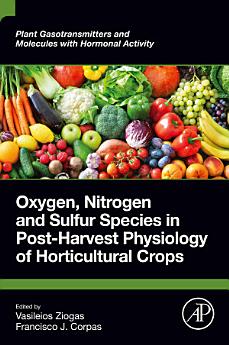Oxygen, Nitrogen and Sulfur Species in Post-Harvest Physiology of Horticultural Crops
About this ebook
About the author
Dr. Vasileios Ziogas is a researcher at the Hellenic Agricultural Organization – DIMITRA (ELGO-DIMITRA). He was awarded his doctoral degree (PhD) from the Faculty of Agriculture of the Aristotle University of Thessaloniki, Greece. His doctoral thesis was focused upon the study of Hydrogen Sulfide and Nitric Oxide as priming molecules towards drought stress upon citrus plants. His scientific research focuses on the study of nitro-oxidative signalling pathways involved in the plant’s response to stress factors, while emphasis is being given in the research of treatment technologies towards the amelioration of abiotic stress factors and prolong of postharvest life of agricultural commodities. To date Dr. Ziogas is the author of 17 scientific papers published in peer-reviewed journals, as well as 3 book chapters. He currently serves as peer reviewer in several SCI journals.
Francisco J. Corpas is a Research Professor of the Spanish National Research Council (CSIC) who has more than 30 years of research experience in the metabolism of Reactive Oxygen, Nitrogen and Sulfur Species (ROS, RNS and RSS, respectively) in higher plants under physiology and environmental stress conditions using the model plant Arabidopsis thaliana, as well as plants of agricultural interest. Research interests include the implications of these reactive species in fruit ripening and the nitro-oxidative metabolism of plant peroxisome. He was the Head of the Department of Biochemistry, Cell and Molecular Biology of Plants (2014-2018) at Research Institute named “Estación Experimental del Zaidín -CSIC, Granada, Spain. He has published more than 226 refereed research papers/review articles in peer-reviewed journals and has edited ten books.






